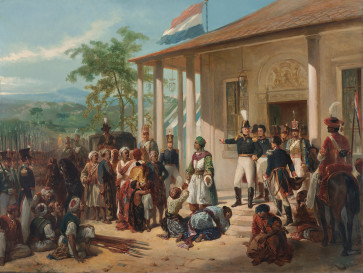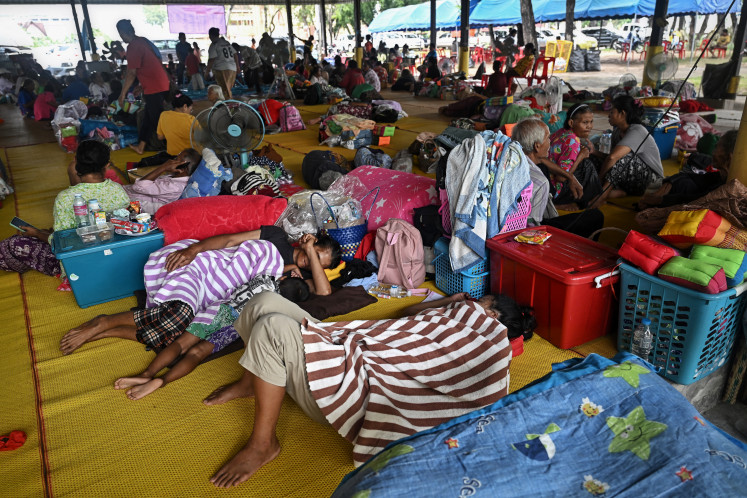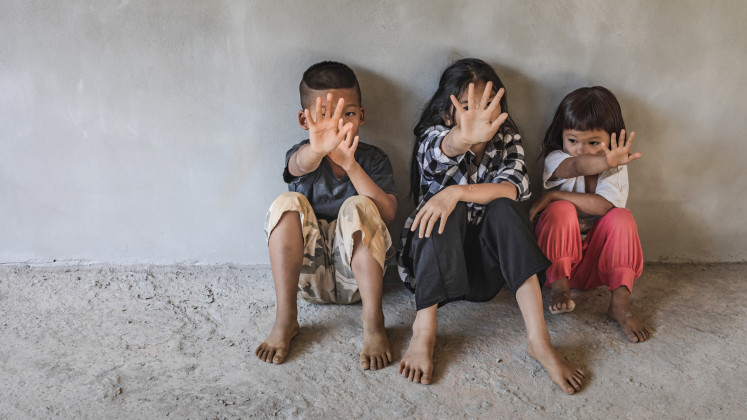Popular Reads
Top Results
Can't find what you're looking for?
View all search resultsPopular Reads
Top Results
Can't find what you're looking for?
View all search resultsChandra Setiawan: Balancing economics & humanity
JP/Ika KrismantariTwo doctoral degrees have not stopped Chandra Setiawan from doing good deeds
Change text size
Gift Premium Articles
to Anyone
J
span class="caption" style="width: 398px;">JP/Ika KrismantariTwo doctoral degrees have not stopped Chandra Setiawan from doing good deeds.
The PhD in education management and finance studies is also an important and inspiring figure in human rights and interfaith dialogue in Indonesia.
The 51-year-old is the man behind the recognition of Confucianism as one of the official religions in the country, which had banned all Chinese traditions, including Confucianism, in the late 1960s for being considered communist.
The coordinator and previous chair of the Supreme Council of Confucian Religion in Indonesia (Matakin) worked hard to lobby officials, ministers and even then president Abdurrahman Wahid (Gus Dur) to revoke the ban and acknowledge the religion that has existed for hundred of years in Indonesia.
The years of hard work finally paid off with the acknowledgment of Confucianism as the sixth official religion in the country in 2006.
Chandra explained that his position as one of commissioners in the National Commission on Human Rights between 2002 and 2007 also played a strong role in garnering the new status for Confucianism.
But Chandra’s social welfare and human rights projects did not end after that mission was completed.
His main reason for continuously promoting interfaith partnerships is because he strongly believes the problems in Indonesia are too complicated to be handled alone. Solving those matters requires the involvement of all citizens, regardless of social or religious background.
For that purpose, Chandra has been cooperating with other religious leaders and participating in activities that promote interfaith dialogue, with the latest endeavor him joining the Global Peace Festival Foundation and becoming the Indonesian representative for the institution.
He even became the executive director for the 2010 Asia Pacific Global Peace Festival, held for the first time in Indonesia.
Now, Chandra’s daily life is filled with social work that focuses on recruiting youth to actively get involved in developing tolerance in Indonesia.
“Because the future of our state lies in their hands,” he explained of his current work to The Jakarta Post in a recent interview.
In line with his mission to guide the country’s next generation, the man, who has been interested in pluralism since he was young, is also still active in Matakin as the head of the education, training and empowerment division.
Years of dedication in the field has brought him several acknowledgments, with the highest an appointment as Ambassador for Peace by the Interreligious and International Federation for World Peace in Bangkok, Thailand, in 2001.
Chandra has also several times been trusted to represent Indonesia at various international forums that deal with the issue of pluralism and interfaith dialogue for world peace.
Apart from those achievements, Chandra has also excelled in another area that may seem to have little concern for humanity.
The fighter for freedom of religion is also an expert in economics, with some saying the goal to obtain maximum profits can undermine others, including human values.
However, it seems in Chandra’s hands the two fields can harmoniously support each other for the purpose of peace.
The former rector of the Institute of Business and Informatics Indonesia (IBII) elaborated how he included social values in economic calculations and how he applies economic principles of sustainability in his humanitarian work.
He admitted it was religious wisdom that had kept him away from being an “economic animal” who was only interested in securing high profits at minimum cost.
“I always put wisdom in my teachings on economics, because if people do not include religious values, the science will mean nothing. In the end, it only encourages us to justify any means to reach goals,” the lecturer in financial and corporate management said.
A similar thing also happens when Chandra gets involved in humanitarian actions.
He cannot avoid not using his knowledge of business and management to ensure the sustainability of his social programs.
“We must know economic principles. If not, social organizations, which cannot manage their cash flow, cannot sustain [themselves]. They will stop,” said the man, who is a financial consultant for a number of social foundations.
Chandra’s passion for social and humanitarian action regarding pluralism has been developing from an early age.
Hailing from the multicultural Bangka region, Chandra has been exposed to a variety of cultures and religious values since he was little. And, it was his open and democratic family that taught him about tolerance and to respect the beliefs of those of other religious faiths.
He said he felt lucky being brought up in a society where there was no gap between one religion and another.
Unfortunately, things changed dramatically when he moved to Yogyakarta in the late 1970s to continue his studies.
He realized his religion made him different in Muslim-dominated Java.
Chandra said he finally experienced being discriminated against as a minority.
“I was forced to leave empty the column on religion on my identity card because I didn’t want them
to fill it in with another religion,”
he explained of the past discrimination against Confucians by the
government.
It was his active involvement in the Indonesia Young Confucian Association (Pakin) in high school that led him to the fight against discrimination and the struggle for the state’s recognition of Confucianism by the state.
Chandra’s strong belief in the rights of every man for religious freedom has fueled his spirit to take part in the long and difficult battle.
Even after the one battle ended with the victory of Confucians, Chandra said his job is not done yet.
“As long as people do not use religion for peace, as long as people don’t consider others as brothers or sisters, I feel that action still needs to be done. As long as the culture of violence still exists, I feel that I am still being called to spread the culture of peace,” he elaborated of his never-ending mission.
In response to the current attacks against religious minorities in Indonesia, the founder of the Interfaith Dialogue Society blamed the government for its inability to enforce the law and sanction hard-line groups that threaten the existence of other religions.
With his career in the economic field, Chandra confessed he still hoped to become a professor in finance, which in a couple of months will be realized.
“I hold the belief that every man has two roles. We must not think that humans are only competent in one sector,” said Chandra, commenting on his multiple roles in society.
A lecturer, an economist, a human rights activist, an interfaith supporter and even an aspiring poet, Chandra is a man with different roles, who uses all his knowledge — including his penchant for writing poetry — for one purpose: peace among religions.










